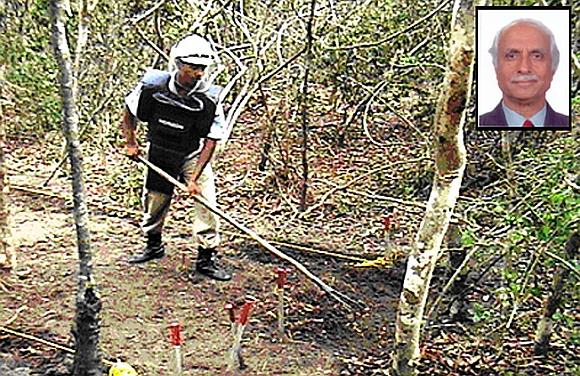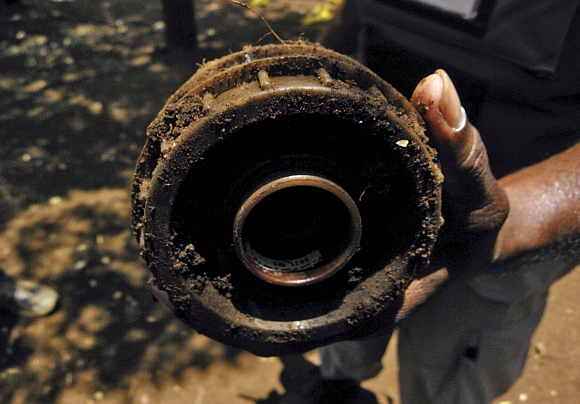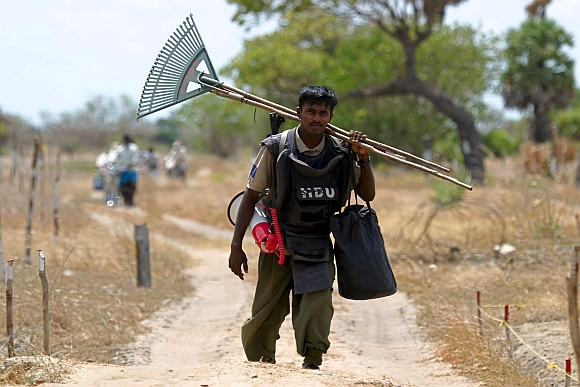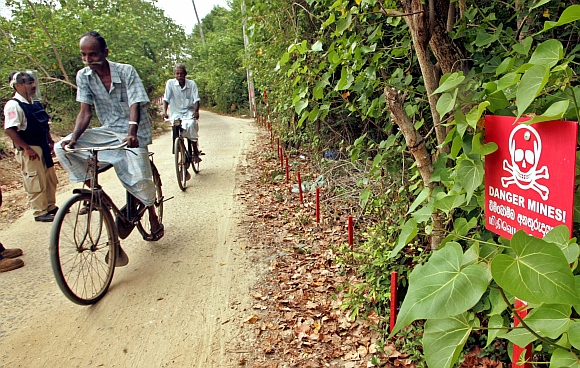Photographs: Photo courtesy: Horizon A Ganesh Nadar in Mumbai
Demining, or land mine clearance, a process of removing land mines (or naval mines) is one of the riskiest jobs in the world.
There are millions of land mines scattered around the world, some since the Second World War. Although their use has been significantly reduced over the years, problems such as clearance and rehabilitation remain. Thousands still die every year because of active land mines.
Horizon is a Pune-based non-governmental organisation, which specialises in humanitarian demining. The NGO was set up nearly a decade ago by eight retired army officers, who have worked in countries such as Sri Lanka and Jordan.
Horizon's Chairman Major General S G Pitre (retired) spoke extensively to rediff.com's A Ganesh Nadar about his organisation's contribution towards this crucial mission.
Was it any particular conflict zone that prompted you to start Horizon?
We (he and his colleagues) had all worked together several times when we were in service, and decided to continue to take it forward after retirement. We wanted to go in for demining because of the hazard it poses to the world over. We already knew how to plant them; we now wanted to go to the other side of the fence and remove them.
Colonel Mittal (a colleague) gained his experience in Congo during a United Nations posting. Mines are laid by countries when they go to war. Unfortunately, now they have fallen into the hands of terrorists. After the mines are laid, they remain there, sometimes, for years.
In theory, the mines have to be removed after a war is over, but that is seldom done, and this practice has been around since the Second World War. Sadly, their victims are mostly civilians, who have nothing to do with the war.
Mines cause 24,000 casualties a years; that makes it one every 20 minutes. Even as we speak, a mine would have exploded somewhere in the world. What we are doing is humanitarian demining, a program which the UN has mandated as 'Mine Action'.
The central idea is to ban mines, but only some countries have done that. Our job is to remove the ones that have been already planted.
...
'We wanted to demine the conflict zone in Sri lanka'
Image: A de-miner searches for mines in a mine field in Kannaddi, located in Mannar district in Sri LankaPhotographs: Nita Bhalla/Reuters
Why did you choose such a highly dangerous service?
There is another important angle to it. We wanted to start an NGO of retired army personnel, working for the army personnel. We see that retired personnel are being employed as guards for a mere Rs 5,000 a month.
We wanted to give them a better deal. They have tremendous amount of experience, talent and skills that we can put to better use than guarding a building with a stick.
This is one of the jobs they are trained for. Also, we pay them far better.
Tell us about your experience in Sri Lanka.
Demining is very expensive and is usually done by the UN. In 2002, during the ceasefire in Sri Lanka, we had let it be known that we wanted to demine the conflict zone. The word spread, and the concerned people approached us.
It has been a wonderful experience in Sri Lanka. We had already been there as a part of the Indian Peace Keeping Force during 1987-1990. We had an added advantage, because many of our soldiers were from Tamil Nadu, and knew the local language. This was very important because part of our mandate is to train the locals to de-mine so that they can carry on after we have left.
Also, since most of the Sri Lankan army comes to India for training, it helps with the rapport with them. When we had gone there earlier, everything north of Vavuniya (a town in northern Sri Lanka) had been destroyed and desolate.
Now it has been rehabilitated. I am a strong supporter of the Tamil cause. I have written about them in a book in Marathi, which is now in its third edition.
We de-mined the whole of northern and eastern Sri Lanka. There were no casualties while de-mining. We have taken out 1,50,000 mines there. There are standards imposed by the UN on demining, so there is no chance of accident or loss.
...
'We work within our budget parametres'
Image: A de-miner shows anti-personnel landmine laid by separatist Tamil Tigers in Sri LankaPhotographs: Nita Bhalla/Reuters
You attended a meeting in Dubai in December, 2010 on mines. Did you learn something new?
The UN had organised the meet, with many countries and NGOs working in the de-mining field as invitees. We discussed what had been done so far and how could we improve on it.
We learnt about other systems when we work in an international environment. We must also know the mindset of the other people, so that we can work better with them. We also had a chance to show that India was also doing its bit in de-mining around the world.
How does the funding from the Indian and the Norwegian governments for your cause work?
This is a humanitarian mission, not a tender or contract. The funding does not depend upon the number of mines we take out. We give them specifics about the equipment we need, the number of people required, and the timeframe. They release the funds accordingly.
This work is resource based and not result based. Once we have been told the budget, we work within those parameters. The Norwegian government funded us for many years, and we finished work for them in last December.
The Indian prime minister had promised Sri Lanka an aid of $500 million after the ethnic war ended in 2009. Part of that money was given to us for de-mining.
...
'Trained civilians carry on the job after we leave'
Image: A de-miner walks home after working on a minefield at Elephant Pass in Sri Lanka's northern Jaffna peninsulaPhotographs: Anuruddha Lokuhapuarachchi/Reuters
Is the training provided by you for civilians or army personnel?
The people we train in India are all army personnel. They already know the subject; we just give them a refresher course in humanitarian de-mining. But in Sri Lanka, we train civilians who assist us first, and then carry out the work after we leave.
What happens to a mine after it has been taken out?
We destroy it and also any other unexploded ordnance that we find.
Tell us something about the 15 women de-miners who worked in Sri Lanka.
Horizon is the first organisation in the world that trained women. They were all civilian, working women. We trained about 40 of them, and they did everything that our other trained personnel do.
Sir, tell us about your work in Jordan?
The mines were scattered around the Jordan-Israel border area. Jordan had signed the 1997 Ottawa Treaty to stop using mines. They were given a certain timeframe for mine removal.
Norwegian People's Aid, an NGO that does the demining in Jordan asked us if we would like to work with them, and we agreed.
While in Sri Lanka, we removed anti-personnel mines, in Jordan we removed anti-tank mines. We deactivated about 40,000 mines there. We were there for a whole year in 2006.
...
'We can build so much goodwill at low cost'
Image: Sri Lankans cycle near a minefield in Irupalai, on the outskirts of JaffnaPhotographs: Kamal Kishore/Reuters
How many people were with you when you started in 2001?
We started as a group of 35, which rose to 75 in Sri Lanka. In all, we have trained 300 men and women. Our organisation has only eight core members. We recruit people when we need them.
We always keep a pool of trained personnel in reserve at all times. They are all former army people, and are paid Rs 35,000 a month.
Why is your work limited to only Sri Lanka and Jordan? There are so many other conflict zones around the world.
We want to go to so many places, but it needs heavy funding.
The Udaipur Fort had to be restored after an explosion in 1984. The Maharajah requested us to check if there were any other explosives buried there. After a thorough check, we declared it clear.
Tell us about your future plans...
We have written to the ministry of external affairs and told them that we would like to work in Vietnam, Cambodia and Laos. We have told them that this work should be an instrument of foreign policy.
We want to be a super power. We want to be in the UN Security Council. Shouldn't we be doing something to make the world more secure?
We can build so much goodwill at low cost by making conflict zones safe in other countries.
Today Sri Lanka is full of Bajaj autos. Similarly, Tata Nanos run as taxis there. These organisations could lend us a under their corporate social responsibility schemes. Similarly, other private Indian firms doing business in Sri Lanka could also sponsor us there.







article